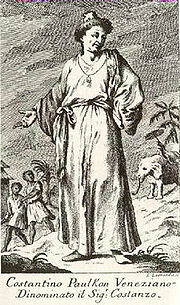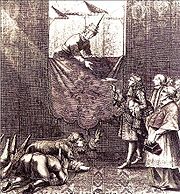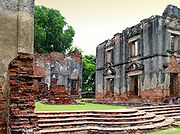
Constantine Phaulkon
Encyclopedia



Greeks
The Greeks, also known as the Hellenes , are a nation and ethnic group native to Greece, Cyprus and neighboring regions. They also form a significant diaspora, with Greek communities established around the world....
adventurer, who became first counsellor to King Narai
Narai
Somdet Phra Narai or Somdet Phra Ramathibodi III was the king of Ayutthaya from 1656 to 1688 and arguably the most famous Ayutthayan king. His reign was the most prosperous during the Ayutthaya period and saw the great commercial and diplomatic activities with foreign nations including the...
of Ayutthaya
Ayutthaya kingdom
Ayutthaya was a Siamese kingdom that existed from 1350 to 1767. Ayutthaya was friendly towards foreign traders, including the Chinese, Vietnamese , Indians, Japanese and Persians, and later the Portuguese, Spanish, Dutch and French, permitting them to set up villages outside the walls of the...
.
Born on the Ionian island of Kefalonia
Kefalonia
The island of Cephalonia, also known as Kefalonia, Cephallenia, Cephallonia, Kefallinia, or Kefallonia , is the largest of the Ionian Islands in western Greece, with an area of . It is also a separate regional unit of the Ionian Islands region, and the only municipality of the regional unit...
, Phaulkon came to Siam (today's Thailand
Thailand
Thailand , officially the Kingdom of Thailand , formerly known as Siam , is a country located at the centre of the Indochina peninsula and Southeast Asia. It is bordered to the north by Burma and Laos, to the east by Laos and Cambodia, to the south by the Gulf of Thailand and Malaysia, and to the...
) as a merchant in 1675 after working for England's East India Company
British East India Company
The East India Company was an early English joint-stock company that was formed initially for pursuing trade with the East Indies, but that ended up trading mainly with the Indian subcontinent and China...
. He became fluent in Thai
Thai language
Thai , also known as Central Thai and Siamese, is the national and official language of Thailand and the native language of the Thai people, Thailand's dominant ethnic group. Thai is a member of the Tai group of the Tai–Kadai language family. Historical linguists have been unable to definitively...
in just a few years and began to work at the court of King Narai as a translator (he was also fluent in English
English language
English is a West Germanic language that arose in the Anglo-Saxon kingdoms of England and spread into what was to become south-east Scotland under the influence of the Anglian medieval kingdom of Northumbria...
, French, Portuguese, and Malay
Malay language
Malay is a major language of the Austronesian family. It is the official language of Malaysia , Indonesia , Brunei and Singapore...
). Due to his experience with the East India Company, he was soon able to become a counsellor of the king.
In 1682, Phaulkon abandoned Anglicanism
Anglicanism
Anglicanism is a tradition within Christianity comprising churches with historical connections to the Church of England or similar beliefs, worship and church structures. The word Anglican originates in ecclesia anglicana, a medieval Latin phrase dating to at least 1246 that means the English...
for Catholicism
Roman Catholic Church
The Catholic Church, also known as the Roman Catholic Church, is the world's largest Christian church, with over a billion members. Led by the Pope, it defines its mission as spreading the gospel of Jesus Christ, administering the sacraments and exercising charity...
and soon after married a Catholic woman of mixed Japanese
Japanese people
The are an ethnic group originating in the Japanese archipelago and are the predominant ethnic group of Japan. Worldwide, approximately 130 million people are of Japanese descent; of these, approximately 127 million are residents of Japan. People of Japanese ancestry who live in other countries...
-Portuguese
Portuguese people
The Portuguese are a nation and ethnic group native to the country of Portugal, in the west of the Iberian peninsula of south-west Europe. Their language is Portuguese, and Roman Catholicism is the predominant religion....
-Bengali
Bengali people
The Bengali people are an ethnic community native to the historic region of Bengal in South Asia. They speak Bengali , which is an Indo-Aryan language of the eastern Indian subcontinent, evolved from the Magadhi Prakrit and Sanskrit languages. In their native language, they are referred to as বাঙালী...
descent named Maria Guyomar de Pinha
Maria Guyomar de Pinha
Maria Guyomar de Pinha, also Maria Guiomar de Pina, Dona Maria del Pifia, Marie Guimar or Madame Constance in French or Thao Thong Kip Ma , was a Siamese woman of the 17th century who lived in Ayutthaya, Siam...
. They lived a life of affluence as Phaulkon rose to become highly influential at the Siamese court of king Narai
Narai
Somdet Phra Narai or Somdet Phra Ramathibodi III was the king of Ayutthaya from 1656 to 1688 and arguably the most famous Ayutthayan king. His reign was the most prosperous during the Ayutthaya period and saw the great commercial and diplomatic activities with foreign nations including the...
.
Following troubles with the English
Kingdom of England
The Kingdom of England was, from 927 to 1707, a sovereign state to the northwest of continental Europe. At its height, the Kingdom of England spanned the southern two-thirds of the island of Great Britain and several smaller outlying islands; what today comprises the legal jurisdiction of England...
and the Dutch
United Provinces
United Provinces may refer to:* United Provinces, another name for the Dutch Republic , now The Netherlands* United Provinces of Agra and Oudh , a former province of British India; now Uttar Pradesh...
, Phaulkon engineered a Franco-Siamese rapprochement leading to the exchange of numerous embassies between France
Kingdom of France
The Kingdom of France was one of the most powerful states to exist in Europe during the second millennium.It originated from the Western portion of the Frankish empire, and consolidated significant power and influence over the next thousand years. Louis XIV, also known as the Sun King, developed a...
and Siam
Ayutthaya kingdom
Ayutthaya was a Siamese kingdom that existed from 1350 to 1767. Ayutthaya was friendly towards foreign traders, including the Chinese, Vietnamese , Indians, Japanese and Persians, and later the Portuguese, Spanish, Dutch and French, permitting them to set up villages outside the walls of the...
, as well as the dispatch of an expeditionary force by the French in 1687. Phaukon was called "Monsieur Constance" by the French, and was their main ally for several years.
The Abbé de Choisy, who was part of the first French embassy to Thailand in 1685, wrote about M. Phaulkon's character:
Phaulkon's closeness to the king naturally earned him the envy of some Thai members of the royal court, which would eventually prove to be his undoing. When King Narai became terminally ill, a rumor spread that Phaulkon wanted to use the designated heir, Phra Pui, as a puppet and actually become ruler himself. As unlikely as this was, it provided an excuse for Pra Phetracha
Phetracha
Phetracha was a king of the Ayutthaya kingdom in Thailand, usurping the throne from his predecessor King Narai and founding the Ban Phlu Luang dynasty, the final one of the Ayutthaya kingdom...
, the foster brother of Narai to stage a coup d'état
Coup d'état
A coup d'état state, literally: strike/blow of state)—also known as a coup, putsch, and overthrow—is the sudden, extrajudicial deposition of a government, usually by a small group of the existing state establishment—typically the military—to replace the deposed government with another body; either...
, the 1688 Siamese revolution
Siamese revolution (1688)
The Siamese revolution of 1688 was a major popular upheaval in the Siamese Ayutthaya Kingdom which led to the overthrow of the pro-foreign Siamese king Narai...
. Without the king's knowledge, both Phaulkon and his followers as well as the royal heir were arrested and executed on June 5, 1688 in Lopburi
Lopburi
Lopburi ) is the capital city of Lopburi Province in Thailand. It is located about 150 km north-east of Bangkok. As of 2006 it has a population of 26,500...
. When King Narai learned what had happened, he was furious -- but was too weak to take any action. Narai died several days later, virtually a prisoner in his own palace. Phetracha then proclaimed himself the new king of Siam and began a xenophobic regime which expelled almost all foreigners from the kingdom.
The different interpretations of Phetracha's motivation for ordering the arrest and execution of Phaulkon have made the Greek's position in Thai history somewhat controversial. Supporters of Phetracha's actions have depicted Phaulkon as an opportunistic foreigner who sought to use his influence to control of the kingdom on behalf of Western interests. More skeptical historians believe that Phaulkon was simply a convenient scapegoat - a means for Phetracha to seize the throne from the rightful heir by capitalizing on the envy and suspicion Phaulkon had engendered.

